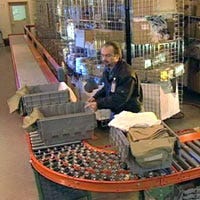Washington Corrections Center
Washington Corrections Center (WCC) is the state's intake facility for incarcerated men who enter the state prison system from city and county correctional facilities. It can house over 1,600 medium, close, and maximum custody incarcerated men. Class II operations at WCC are as follows:


Food Services represents one of five food service operations under CI management, and vertically integrates with CI's food factory production by serving CI produced foods accompanied by non-CI produced products. The centralization of purchasing and use of a statewide standard 4-week cycle menu has stabilized facility food service budgets. The 4-week cycle menu provides for nationally recommended allowances for basic nutrition, which are reviewed annually by dietitian, and are aligned with the Dietary Guidelines for Americans (DGA’s). Food Services prepares on average 135 thousand meals per month, which equates to approximately 1.6 million meals per year. While working for CI Food Services, incarcerated workers receive a full scope of food service skills and can earn ServSafe® food manager certification, a nationally recognized food safety certification. Food Services operates two shifts, seven days per week.


Laundry
The laundry processes on average 140 thousand pounds of linen and clothing per month, which equates to approximately 1.7 million pounds per year. This includes laundry service to Washington Corrections Center for Women, and Mission Creek Corrections Center for Women. Incarcerated workers can earn certificates of proficiency in various laundry skills. Individuals meeting specific criteria can attain Association of Linen Management certifications as Washroom Technicians and/or Linen Technicians.


Reception Clothing Distribution
The distribution center processes 600-700 clothing transfer/admission bags per month which equates to 7,200 clothing bags annually. Incarcerated workers process, pick, package, and ship male and or transgender incarcerated clothing for transfers to their parent facilities. Incarcerated workers can earn certificates of proficiency as material handlers, procurement clerks, bookkeeping and accounting clerks, as well as shipping and receiving clerks.
Textile operations produces more than 500 items per day dependent on item mix and demand. They make laundry bags, property bags, jersey shorts and t-shirts utilized in transfer bags. Incarcerated workers can earn certificates of proficiency as sewing machine operators, maintenance repair workers, and as inspector tester sorter samplers for Quality Control.
Commissary services are provided once a week to the fluctuating population which equates to approximately 83,200 orders per year. The commissary also handles the CI food package program that is offered 4-6 times a year to the population. Incarcerated workers can earn certificates of proficiency in shipping and receiving clerks.
